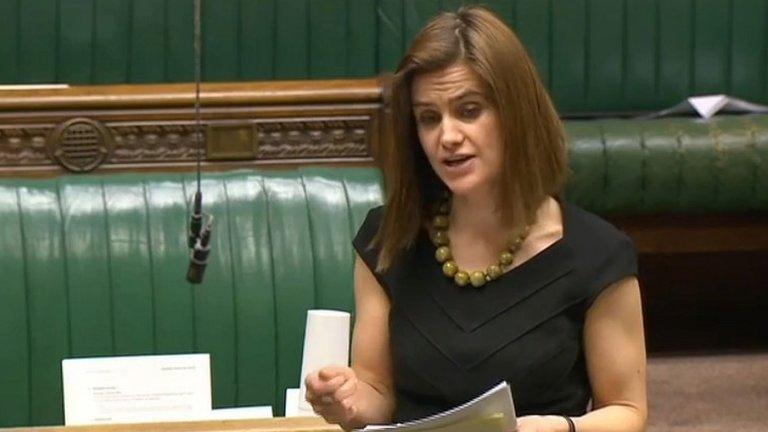Week ahead
- Published
- comments
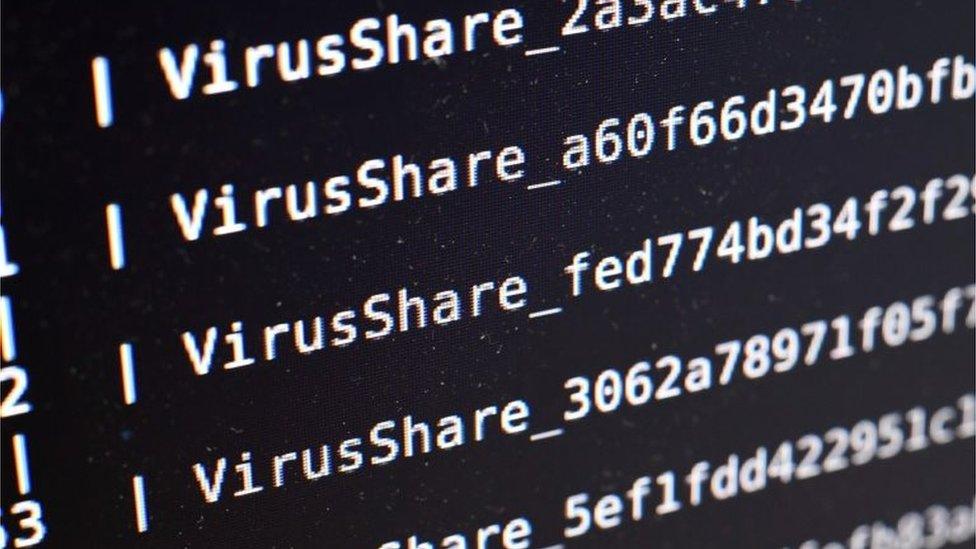
The Digital Economy Bill faces report stage in the Commons on Monday.
There's some important law-making afoot in both houses this week, on issues from blocking porn sites to whether special constables can use CS gas - and there could be another attempt by peers to summon the second stage of the Leveson Inquiry into the press, on relations between journalists and the police, back from the limbo to which is has been consigned by an unenthusiastic government.
Elsewhere there's some significant action on the committee corridor, with quite a collection of Cabinet ministers appearing before various committees.
As the current crop of bills before Parliament peters out, the committee corridor may well become the focus of attention for the coming months, particularly with 30 select committee inquiries into various Brexit-related topics now under way.
Here's my rundown of the week ahead:
Monday
The Commons week begins (2.30pm) with Communities and Local Government questions - with any post-weekend ministerial statements or urgent questions following at 3.30pm.
The main legislating is on the Digital Economy Bill, external, where there are some significant issues in play at report stage.
The government has accepted an important amendment from the former minister Claire Perry, who had heavyweight cross party backing for her call to add powers to the bill allowing the government to make internet service providers block porn websites that failed to comply with a requirement for age verification for their viewers.
The argument was that this was needed to give real teeth to the bill, and it has now been accepted by ministers, who're bringing in their own version of these powers, in a government amendment.
Labour, though, have reservations about the new government proposal and may even vote against it. And they argue that the best defence for children is compulsory sex education, starting at Key Stage 1, and will be pushing an amendment to that effect.
Watch out too for a Labour new clause, which seeks to create a procedure to deal with the growing problems of breaches of personal data security. This would create an obligation on data controllers to notify the Information Commissioner and those whose details had been compromised.
Labour also want to add in new laws to combat ticket touts and they will also be opposing the clauses transferring the policy over free BBC licence fees for the over-75s to the BBC, on the argument that the Corporation is not the appropriate body to take decisions on welfare policy. They plan to force that issue to a vote.
The Westminster Hall debate (4.30pm- 7.30pm) is on e-petition 162934 relating to child cancer - which calls on the government to make more funding available in the fight against child cancer.
The debate will be led by the Conservative, Ben Howlett, who said the petition had been brought by a couple whose child sadly passed away after a battle with a very rare cancer. Childhood cancer is the biggest killer by disease of children in the western world and currently the survival rates vary considerably between different types of cancer, age and gender. He wants to urge the government to do more to look at the funding for both research and testing new drugs for childhood cancer as well as new awareness campaigns aimed at parents.
Committee of the day is the Transport Committee hearing (4.05pm) on rail safety, which will ponder the issues around rising passenger numbers and problems, with the Rail Delivery Group, the Rail Safety and Standards Broad (RSSB) as well as the ASLEF, RMT and Unite trade unions.
In the Lords (from 2.30pm) peers have another day debating the Pension Schemes Bill, external at committee stage - key issues include more on Master Trusts and on private pension scheme exit fees.
And the Lib Dem peer, Lord Alderdice, leads a debate on ensuring parity of esteem between mental and physical health.
Tuesday
The Commons opens (11.30am) with Treasury questions - followed by the day's Ten Minute Rule Bill which is on Statutory Nuisance (Aircraft Noise) - fresh from a Westminster Hall debate on this issue, Dr Tania Mathias, whose constituency lies under the Heathrow flightpath, takes her battle against a third runway to the floor of the Commons chamber.
That is followed by the second reading of the Commonwealth Development Corporation Bill, external - a two-clause micro-measure which will raise the limit on government financial assistance that can be provided to CDC Group (formerly the Commonwealth Development Corporation) (the "CDC") to £6bn.
This could be a micro-second reading debate as well - leaving time for opposed private business - a number of private bills (bills dealing with a private interest) have popped up from time to time, for formal approval, only to be pulled when backbench vigilantes like Christopher Chope threaten to object to them. The aim of these challengers it to get the measures debated - and this may now occur.
In Westminster Hall, my eye was caught by the debate led by Plaid Cymru's Liz Saville Roberts, on CCTV in equine slaughterhouses (2.30pm-4pm).
My committee pick is the Justice Committee hearing (9.45pm) with Prisons Minister Sam Gyimah and Michael Spurr, Chief Executive of the National Offender Management Service. The current state of the prison system can hardly be avoided. Unusually this inquiry begins, rather than ends with a hearing with a minister - and its focus could well branch out in several directions, as the hearings continue.
Health Secretary Jeremy Hunt, Public Health England and NHS officials give evidence to the Health Committee on suicide prevention and whether there is sufficient support for mental health in the NHS (2.30pm).
And there's an interesting in-house encounter - the Standards Committee hearing (10am) on the MPs' Code of Conduct and Guide to the Rules. The witnesses include the MPs' main shop stewards: Graham Brady, Chair of the Conservative backbench 1922 Committee; John Cryer, Chair of the Parliamentary Labour Party, and Angus Robertson, Deputy Leader of the SNP; plus Bernard Jenkin, Chair of the Public Administration and Constitutional Affairs Committee; Dr Sarah Wollaston, Chair of the Health Committee, and backbench standards crusader, John Mann, one of the most active complainants on standards issues (at 10.50am).
In the Lords (2.30pm) the main debate is on the economy, in the light of the Autumn Statement.
Wednesday
The Commons opens (11.30am) with half an hour of Welsh questions, followed at noon by PMQs.
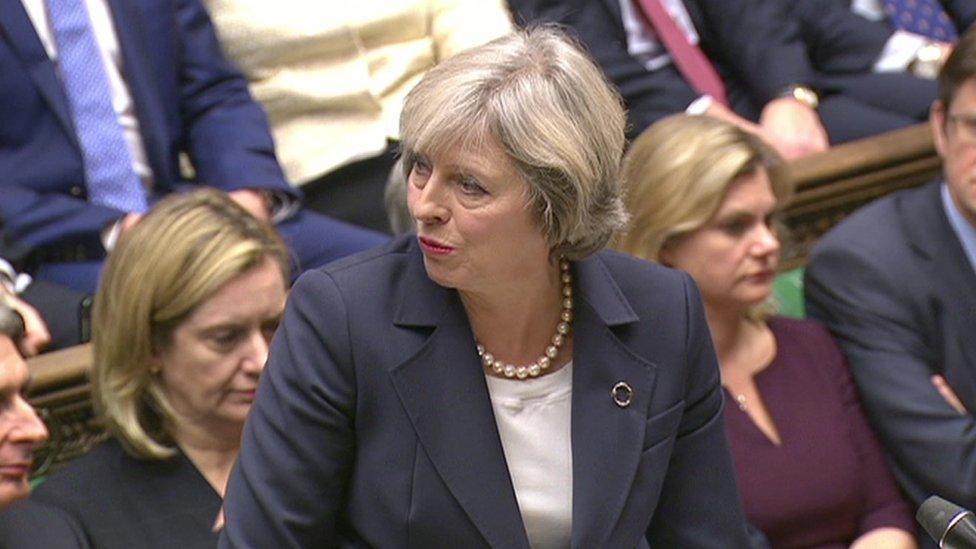
It's PMQs at noon as usual on Wednesday, as Theresa May faces Jeremy Corbyn across the dispatch box.
Then, the Labour MP Justin Madders proposes a Ten Minute Rule Bill to make it easier for young people to go to games; his Football Supporters (Access) Bill deals with ticket prices and kick off times and calls for a proportion of transfer fees to be earmarked to develop facilities for local clubs and young people.
The day's main debate will be on an SNP motion - subject to be announced - and there's an intriguing looking adjournment debate from the SNP's Gavin Newlands, on Paisley's cultural contribution to the world.
And Work and Pensions Secretary Damian Green will be questioned (9.30am) by the Work and Pensions Committee about his department's finances, after the cash injection in the Autumn Statement.
My other committee pick is Transport Secretary Chris Grayling's appearance before the Environmental Audit Committee (2.20pm), to talk about the environmental concerns around Heathrow expansion and the plans to mitigate air pollution, carbon emissions and noise from a new runway.
In the Lords (3pm) the main legislation is the first report stage day on the Policing and Crime Bill, external - this measure will probably provide the Lords' last serious legislative clashes of 2016.
There are some big issues to be fought out.
First, behind the scenes negotiations are under way to find a compromise on the provision for Police and Crime Commissioner to take over the fire and rescue authority for their area. Labour have an amendment down to delete this entire section of the bill (Clause 6), but could well be dissuaded if the government is prepared to offer stricter requirements for local consultation on such proposals - and a new government amendment on this issue has now appeared.
Compromise is less likely on Labour amendments to prevent Special Constables using CS gas and PAVA sprays, and this may be forced to a vote. There will also be an amendment on restriction on the use of police cells for those with mental health conditions
But the biggest clash may be over an attempt to add in a requirement to hold a Leveson 2-style inquiry into relations between the police and the media - as I write, no amendment has appeared but one is expected, probably fronted by a crossbench peer, but with substantial cross party support.
If passed it would probably occasion an awkward bout of parliamentary ping-pong between Lords and Commons. And there will be plenty more controversial amendments on the next day of report stage...
As ever, on report stage days in the Lords, timing is important, and opposition amendments usually stand less chance if they're debated after the dinner break, when a lot of peers go home.
There will also be a short debate on current UK political strategy towards and plans to develop economic, security and cultural relations with Tunisia.
Thursday
The Commons opens (9.30am) with Exiting the European Union questions, followed by the weekly Business Statement from the Leader of the House, David Lidington, setting out what will be on the Commons agenda in the coming weeks.
The day's main debates are on subjects chosen by the Backbench Business Committee. First is a debate on a motion on transgender equality: Maria Miller, Angela Crawley which will follow up on the first report of the Women and Equalities Select Committee, which looked at this issue, external.
That's followed by a general debate on the future of the UK fishing industry. An annual fisheries debate used to be a fixture of the parliamentary calendar, but since the creation of the Backbench Business Committee, the subject has had to take its chances along with many others.
In the Lords (11am) the main debates are on options for the UK's future relationship with the EU following the referendum - led by Lord Liddle, Tony Blair's former EU advisor, and on challenges in the current system of social care, proposals for reviewing and longer-term reform - led by Labour's Baroness Pitkeathley, a former chief executive of Carers National Association (now Carers UK).
The final debate is on the EU net-neutrality Connected Continent requirements, UK adult content filtering regimes and keeping children safe online.
Friday
It's private members' bills day in the Commons (9.30am) and first up is the second reading of the SNP MP Mhairi Black's Benefit Claimants Sanctions (Required Assessment) Bill,, external which aims to build new safeguards into the system under which claimants can be "fined" if they fail, for example, to attend a job interview.
She wants the system to take into account any caring or childcare responsibilities, the mental and physical health of the claimant and their housing situation, and to ensure that any claimants who are sanctioned are made aware of any emergency funding they could access. Expect a strong turnout of SNP MPs, but there is little sign of support from the government.
Then comes the Vehicle Noise Limits (Enforcement) Bill, external - from the Conservative, Kevin Foster. The bill would allow noise limits to be enforced via automatic monitoring equipment.
Further down the agenda lurks Ruth Cadbury's Income Tax (Non-Military Expenditure) Bill, external, which would require HMRC to record income tax revenue of people who say they have a 'conscientious objection' to public spending on defence purposes and to direct their taxes that would have been spent on the military to a 'non-military security fund'.
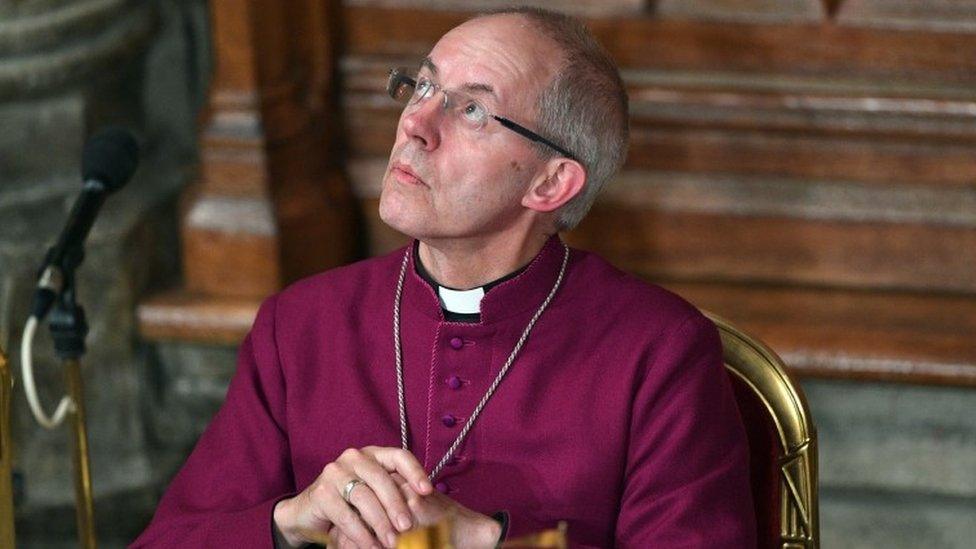
As the third bill on the Order Paper, it has little chance of any extensive debate.
In the Lords (10am) it's the annual Friday where the bishops get to debate the subject of their choice.
The Archbishop of Canterbury, Justin Welby, leads a debate on the "Shared values underpinning our national life and their role in shaping public policy priorities".
Archbishop Welby has had some pretty interesting things to say on this subject - a few extracts from a recent speech give a flavour of the ground he may cover:
"It is imperative that we remind the nation that our values have not emerged within a secular vacuum; but from the resilient and eternal structure of our Judeo-Christian theological, philosophical and ethical heritage. ....The right to life, liberty and the rule of law and robust democratic government does not come cheaply, nor is it held lightly. The roots of our freedom in this country are deeply embedded within our British constitutional and civic life because their foundation lies within the shared scriptural inheritance of our faith traditions.....Democracy is not in and of itself the final answer to things, nor is the rule of law. Martin Luther King did not accept the final authority of the rule of law when the law is unjust. Quite rightly, Bonhoeffer in the 1930s did not accept the final authority of the rule of law when the law was palpably racist, unjust and anti-Semitic. That's one of the reasons he ended up going to the gallows. As for tolerance, it's a word like 'nice', isn't it? Completely meaningless and overused. Respect is something else - I won't go there.....Our understanding of the rights and responsibilities that flow from our God-given inheritance as human beings, enable us - Jewish and Christian communities together - to be powerful and compelling advocates for freedom in British society.
"The cutting edge of freedom must include the right to disagree, disengage and dissent. It means the freedom of others to criticise us or our views, or for those of us who hold beliefs strongly to change our minds or our beliefs. It means that we all need to be accountable to one another before God and we all need to affirm the right of others to not believe as we do. What it doesn't mean is freedom without accountability to undermine each other's faith, whether casually, incidentally or wilfully. What it cannot mean is the freedom to use language destructively and negatively about those who are different to us - or who take opinions and views with which we profoundly disagree. We have had egregious examples of that in recent weeks, aimed at our judiciary. And what it must never mean is the denial of others to practise or not practise their understanding of their religious or secular identity."
- Published17 June 2016
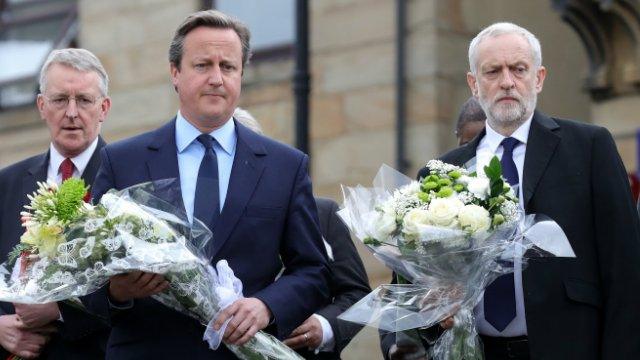
- Published17 June 2016
